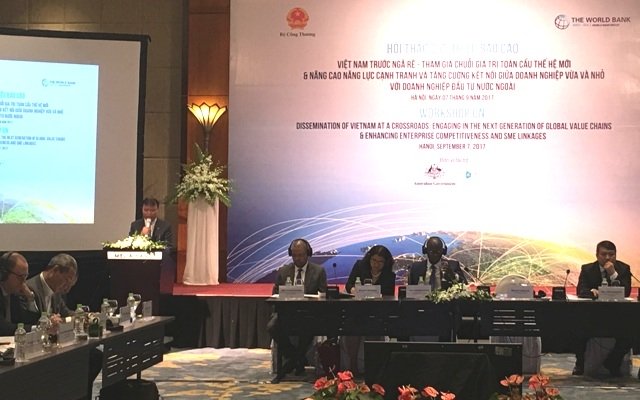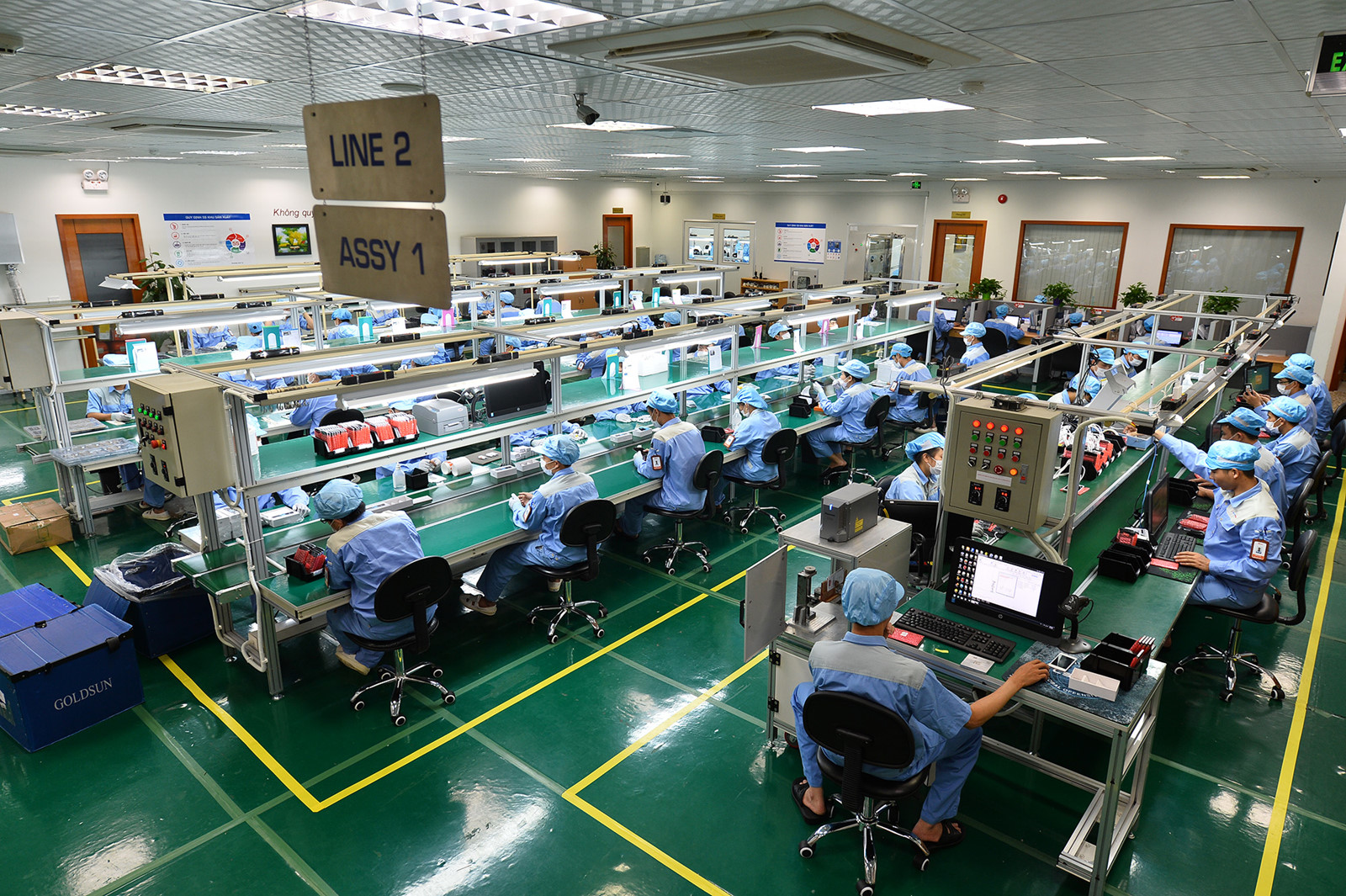World Bank: Vietnam can benefit more from global value chains
Higher value added activities and boosting linkages between domestic firms with foreign markets and investors can help Vietnam move up global value chains, says two new World Bank Group reports.
The reports - titled “Vietnam at a crossroads: Engaging in the next generation of global value chains” and “Enhancing enterprises competitiveness and SME linkages study” was put into discussion in a conference co-organized by Vietnam’s Ministry of Industry and Trade and the World Bank in Hanoi on September 7th, with support from Australia.
The two reports showcase the growth potential of the country’s industries should policy reforms continue.
 |
Mr Do Thang Hai, Vice Minister of Industry and Trade spoke at the event. (Photo: Thuy Hang)
“Foreign Direct Investment, or FDI, has brought enormous gains to Vietnam in terms of growth, exports and jobs. The discussion today and recommendations from these two reports offer many ideas on how Vietnam can participate in the next generation of global value chains, and promote linkages between domestic and foreign firms”, said Do Thang Hai, Vice Minister of Industry and Trade.
Several domestic electronics and automotive companies in Vietnam have successfully integrated into global value chains. But in general, Vietnam has specialized in end-production assembly activities that are largely run by foreign firms with weak domestic linkages.
At the present, some of 300 Vietnamese firms are strong enough to join the global value chains. But most of them have produced simple products with low technology while big groups required three criteria of stable quantity, on-time delivery and suitable prices to join into their production chain.
The Bank identified that Vietnam can now choose to persify and foster the growth of innovative local firms that can potentially lead to products “invented in Vietnam”. A policy framework that aims to strengthen the capabilities and technology of local enterprises is expected to facilitate linkages with FDI firms, and enable them to enter foreign markets.
 |
Photo for illustration
“Vietnam has successfully integrated into a few global value chains, which has created jobs, propelled economic growth, and reduced poverty. But the country can move further up and strengthen its value addition with policy reforms and initiatives in areas such as transport, services, border procedures and regional integration”, spoke Ousmane Dione, World Bank Country Director for Vietnam.
The reports also showed some key recommendations that can take Vietnam closer to its goal are to improve inter-ministerial coordination, facilitate information flows and contacts between domestic and foreign-owned firms, and to provide targeted support to strengthen domestic suppliers.
A higher place for Vietnam in global value chains will help attract more large scale foreign investment into the country, which can create more jobs and more opportunities for local suppliers.
Apart from low productivity, poor innovative ideas, backwardness of the domestic supporting industries sector in comparison with some nations in the region (Malaysia, Thailand, etc) and the shortage of trained-workers, we can see that the lack of approaching financial resources is one of the main barriers for companies in Vietnam, accounting for 21.8% in compared with 11.5% from developing nations in East Asia-Pacific, according to a survey by Mr Asya Akhlaque, the World Bank Chief Economist.
Achieving this goal, however, requires a solid package of reforms and initiatives, such as: closing the infrastructure gap through greater mobilization of private financing and a more integrated approach to developing transport corridors; developing competitive services markets and liberalizing regulations on foreign direct investment; streamlining border procedures to make them more transparent and predictable; and leveraging engagements with developed countries to ensure strong demand and technology-related investment.
Lessons from international and national experience presented at the conference outline the common elements of good programs that link domestic and foreign sectors. These include high-level political commitment and ownership, complemented with sound governance and institutional set-up, as well as an evidence-based strategy to foster linkage programs, a good supplier data base and business-to-business match-making services, and demand-driven supplier development programs.
The report Vietnam at a crossroads : Engaging in the next generation of global value chains was disclosed in March 2017 by World Bank. In the report, researchers lists out Vietnam’s several positive signs of growth.
“Vietnam has emerged as an Asian manufacturing powerhouse, carving out a role for itself within global value chains (GVCs). By specializing in assembly functions on behalf of primarily foreign firms, Vietnam has markedly increased its domestic value added, as reflected by its gross exports, which have grown by 16.6 percent annually between 1995 and 2011.
This export-oriented development strategy has created jobs, propelled economic growth, and reduced poverty. As successful as Vietnam has been, within the context of GVCs, its specialization has been in low value-added,end-production activities. Its challenge is to move up the value chain into higher value-added functions.
Even more ambitious would be to grasp the opportunity to become an originator of products by nurturing a nascent set of domestic firms that have the potential to carve out an “invented in Vietnam” niche in local, regional, and global markets. In short, Vietnam is at a crossroads.
It can continue to specialize in low value-added assembly functions, withindustrialization occurring in enclaves with little connection to the broader economy or society; or it can leverage the current wave of growth to persify and move up the chain into higher value-added functions. Success will require Vietnam’s policy makers to view the processes of development differently and to take new realities of the global economy more fully into account."/.
( VNF/CPV )
Recommended
 National
National
Shangri-La Dialogue 22: Vietnam Highlights Some Issues of Ensuring Stability in a Competitive World
 National
National
Vietnam News Today (Jun. 3): PM Pham Minh Chinh to Attend UN Ocean Conference, Visit Estonia, Sweden
 National
National
Vietnam News Today (Jun. 2): Vietnamese Trade Mission Sounds Out Business Opportunities in United States
 National
National
Vietnam News Today (Jun. 1): Vietnamese, Japanese Firms Foster Partnership
 National
National
Vietnam News Today (May 31): Vietnam Strongly Supports Laos’s National Development
 National
National
Vietnam News Today (May 30): Vietnam, Venezuela Reinforce Ties Through People-to-people Diplomacy
 National
National
Vietnam News Today (May 29): Vietnam and Hungary to Expand Cooperation into New Areas
 National
National
